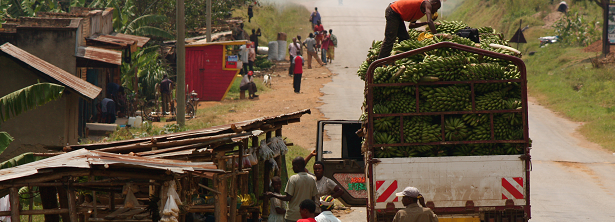Joint learning with a focus on smallholders: a custom-made process

In the end of 2016, the five NWO-WOTRO projects funded within the first call of the Global Challenges Programma (GCP-1) of the Food & Business Research Programme were at their midterm stage. This was accompanied with an evaluation that consisted of two components: an internal self-assessment; and collaborative learning at a joint three-day meeting. This midterm review process has provided insights into the results and (potential) outcomes of the research conducted so far, which overall aims at improving practices and policies for food security.
The five GCP-1 research consortia are working on various issues within a range of countries in Africa, Asia and Latin America, and include researchers and practitioners from the private sector and NGOs. Similar approaches are being taken to engage target groups (most notably small scale farmers) in research execution. This process may be through participatory research approaches (the Inclusive Value Chain project in Ghana and South Africa), by actively sourcing local knowledge on production, as well as on local dietary preferences (in the Fermented Foods project in Zambia), or by focusing on various types of farming in order to assess their impact on food and income security (the Helping Farmers Grow Money project in Sierra Leone).
Joint learning with a focus on small scale farmers
The focus on small scale farmers that can contribute to enhancing food security is well embedded in the five projects. Research consortia have also recognized that a variety of farmer profiles should guide the design of interventions to improve the potential for (broader) implementation.
For example, in the Nutritious Pond project and their focus on aquaculture in Vietnam, the choice was made to develop innovation platforms for small scale shrimp farmers that aim to enhance their production to the level where they can access the market. The project does not include a focus on achieving high-risk intensive farming as that is considered beyond the scope of the project. The project on pork production in Brazil aims at developing and evaluating alternatives to corn and soy for pig feed while sustainably decreasing costs for pork producers. Another crosscutting aspect that came to the forefront is the value of joint learning processes where various sources of knowledge have been included. For instance, the project in inclusive business smallholder partnerships that works in South Africa and Ghana has made use of innovation platforms, and brought together different types of actors from the value chain including smallholders themselves. The project in Zambia works from local knowledge on traditional use of fermented foods and has complemented this knowledge with scientific knowledge on genetics to enhance nutrition as well as knowledge from NGOs and private sector participants to come to a viable business model.
Well considered Inclusiveness strategies
The concept of “inclusiveness” is a common thread throughout the projects, albeit in a variety of forms and approaches. This concept was analyzed in a joint meeting where also external Ghanaian experts from various backgrounds were present as part of the midterm review. To address inclusiveness in the value chain, the significance of both vertical (with actors at various stages in the chains) as well as horizontal relationships (between actors at the same place in and beyond the chain) were revealed in various projects. For example, in the project that works on upgrading sustainable smallholder cocoa productivity in Sierra Leone, the role of the middleman within the value chain as well as in for instance social security has become a focus area. Furthermore, based on their experiences, participants of the projects with the eternal attendees underlined that inclusiveness should be identified as it naturally means exclusion at other levels; The identification of needs capacities and bottlenecks of potential beneficiary groups is necessary for choices in the design of any intervention.
Sustainable institutionalization
The GCP-1 midterm procedure has contributed to identifying and extending crosscutting themes amongst projects, and potential linkages with stakeholders as to reflect on their current status and plans for the second phase of the projects. Taking sustainable institutionalization into account from the onset of the research was found to be vital for embedding results beyond project duration. Wherever relevant, collaboration across projects and with other initiatives will be further stimulated, sought out and deepened to enhance the impact in the range of projects.





